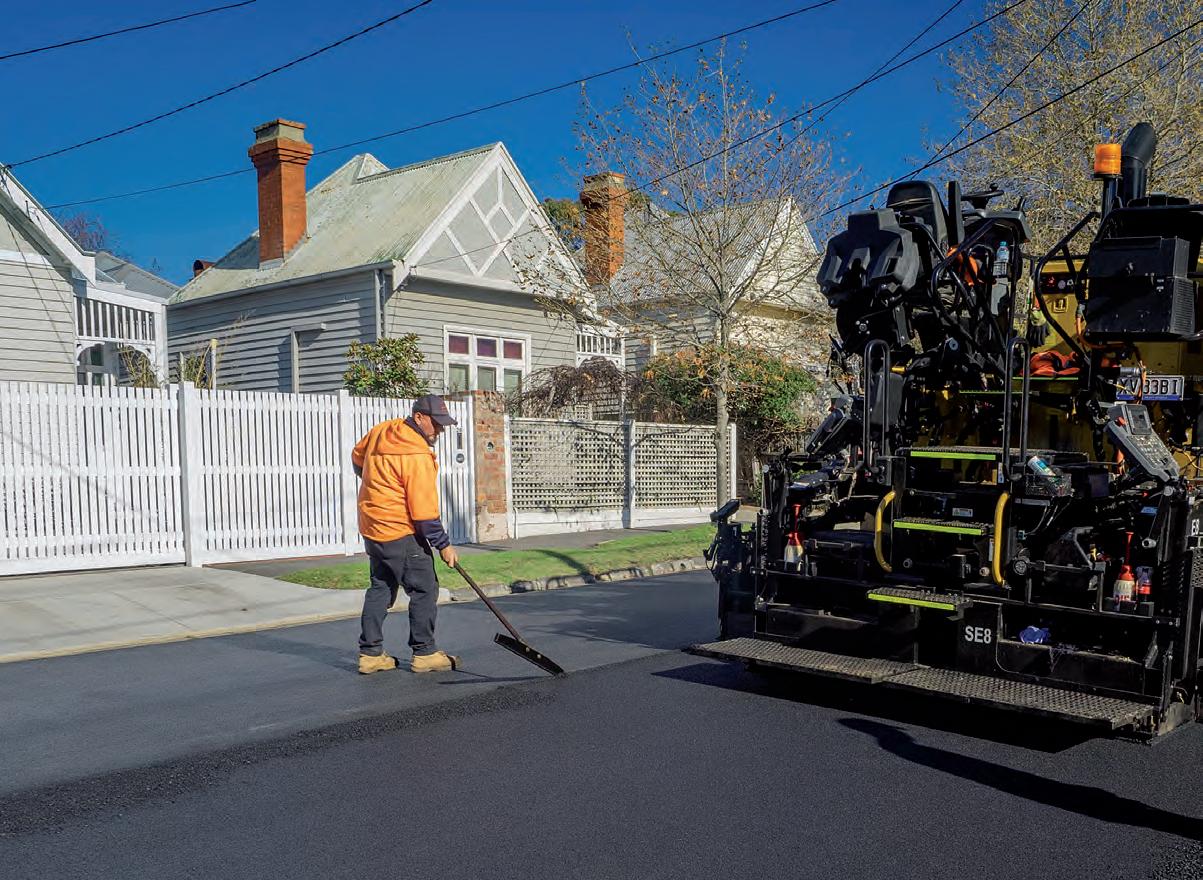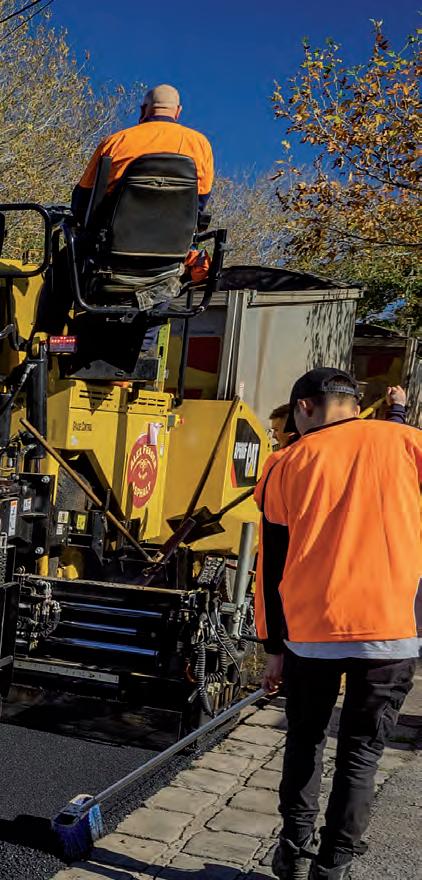
5 minute read
PolyPave
ALEX FRASER’S ANSWER
TO ASPHALT
AS A COMPANY COMMITTED TO ACHIEVING CARBON NEUTRALITY, ALEX FRASER HAS CREATED POLYPAVE, AN ASPHALT PRODUCT THAT CAN CONTAIN HIGH VOLUMES OF RECYCLED MATERIALS INCLUDING PLASTIC, GLASS AND RAP. ROADS & INFRASTRUCTURE REPORTS.
What do roads in the Yarra City Council, Redland City Council, Moreton Bay Regional Council, Maribyrnong City Council, Bayside City Council and more all have in common? The answer is recycled materials, brought together by Alex Fraser’s PolyPave.
Despite being situated in drastically different climates, with varying vehicle loading demands these councils are all using PolyPave, an innovative asphalt product produced using recycled materials such as plastic, glass and RAP.
The first applications of PolyPave took place in 2018 for the Yarra City Council, on the fringe of Melbourne’s CBD and home to lots of high traffic roads.
Alex Fraser was contracted to repair and resurface roads in the municipality with PolyPave incorporating plastic, glass and RAP. Over the first two streets, approximately 7,300 two litre plastic bottles, 55,000 glass bottles and several tonnes of reclaimed asphalt pavement were recycled into the roads.
The project reduced waste to landfill by 97.3 tonnes and cut carbon emissions by 633 kilograms.
Since these works, PolyPave has been used across Australia to resurface roads, reduce landfill and cut carbon emissions.
THE CREATION OF POLYPAVE Alex Fraser General Manger Brendan Camilleri says Alex Fraser’s Technical Manager Peter Lazarus was behind the creation of PolyPave. .
“We are a innovative company focussed on sustainability, and we want to be as carbon neutral as possible, so we investigated ways we could achieve that. We looked at what had been happening overseas and worked out how we could incorporate selected recycled materials into our highperformance pavements,” Camilleri says.
“We went through extensive research and development work to see what materials we could incorporate and ensure any materials we used were not going to have a negative impact on pavement performance or be of any harm to our employees, the environment or the community.”
There is a growing list of reasons the roads industry is looking to incorporate recycled materials including the Council of Australian Governments (COAG) waste export ban which includes, plastic, paper, tyres and glass.
Technical Manager Peter Lazarus says creating a high-performance asphalt with maximum quality and sustainability benefits was the goal for Alex Fraser.
“One of the key benefits of our unique manufacturing process is that we found a way to introduce HDPE plastics to the asphalt and incorporate them into asphalt’s
The first PolyPave road was laid in 2018.

binder product. This alleviates the risk of micro-plastics and aids in the achievement of multiple performance benefits,” Lazarus says.
Alex Fraser’s HDPE plastics are processed predominantly from waste food and cosmetics containers such as milk and shampoo bottles.
“We have partnered with specialists who sort, wash and shred the recovered plastics for us. We’ve worked together with them to ascertain the optimum additive amount, and the best integration techniques that safely incorporate the plastics and achieve performance benefits in pavement,” he says.
Any glass used in PolyPave mixes is recycled by Alex Fraser in a process that turns waste glass fines, unable to be recycled using traditional methods, into sand suitable for use in civil construction materials.
“We have been very careful in our selection of recycled materials to incorporate. When it comes to sustainable product design, our focus is not only on reducing landfill, but ensuring we have a product that improves the quality and longevity of the resulting pavements, as well as ensuring it has no negative, longterm environmental impacts,” Lazarus says.

Currently local government is a major market for PolyPave. Waste reduction, recycling and roads and infrastructure funding are core policy priority areas for the Australian Local Government Association’s 2020-2023 plan prompting the use of products like Polypave.
In Victoria for example, 85 per cent of the Victorian road network is made up of local roads maintained by local government, which give significant opportunity for sustainable change at a local level.
“Local governments are enthusiastic about PolyPave because it helps them achieve their sustainability policies, and because much of its recycled content is sourced from their own kerbside recycling bins. There are no restrictions with PolyPave, it’s suited to all types of projects, big and small,” Camilleri says.
ENVIRONMENTAL PAY-OFF PolyPave is currently produced in Victoria and Queensland and works are now in place to bring Polypave to Cairns. Though the long-term goal for Alex Fraser is to roll PolyPave out worldwide.
Contractors or asset owners can choose the make-up of a PolyPave asphalt mix. It starts with plastic which is integrated into the binder and this can then be mixed with any Green Roads or standard asphalt mixes.
“You could have a simple plastic and RAP mix, or a plastic, glass and RAP mix; it all depends on what asset owners require for their specific project,” Camilleri says.
The sustainable mix is laid in the same fashion as a standard asphalt mix, and he says Alex Fraser has only received positive feedback from internal or external asphalt contractors.
“The environmental benefits are a no
Green Roads PolyPave developers Brendan Camilleri, Peter Lazarus and Nathan Delaney.
brainer,” he says.
“By using PolyPave we are reducing waste to landfill and depending on the chosen mix design you use can achieve a carbon reduction in excess of 65 per cent.”
Since its introduction in 2018 Alex Fraser, and it’s Queensland sister company Suncoast Asphalt, have paved 50,000 tonnes of PolyPave asphalt, diverting more than 15,000 tonnes of waste to landfill, and the equivalent of half a million glass bottles and 1.25 million plastic milk cartons.
“The independent laboratory testing for PolyPave confirmed an increased fatigue life, improved rut resistance, increased asphalt modulus, increased wet tensile strength and a reduction in mix flow, along with the obvious a reduction in plastics to landfill,” Camilleri says.
Lazarus says extensive independent testing was completed to ensure the product is safe for asphalt workers, the broader community and the environment, and to confirmed there was no risk of micro-plastic run-off.
“The reuse of these waste streams in PolyPave asphalt is a prime example of the circular economy in action. The performance benefits are very significant, and on the back of the projected performance results, customers should expect a significantly longer pavement life, saving on costs,” Lazarus says.
Camilleri says the demand for Polypave is certainly growing and he expects that trend to continue.
“This green asphalt can be ripped up and reused again and again; it’s the very definition of recycling. PolyPave is a great example the circular economy in motion - and when you consider the performance benefits, it’s a win, win for everyone.”










